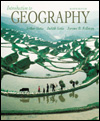 |  Introduction to Geography, 8/e Arthur Getis,
San Diego State University
Judith Getis
Jerome D. Fellmann,
University of Illinois, Urbana-Champaign
The Regional Concepts
Objectives:After reading and studying this chapter you should be able to:
1.
Define what geographers mean by the term region.
|
 |  |  | 2.
Classify regional descriptions as being either "formal" or "functional".
|
 |  |  | 3.
Draw appropriate boundaries separating regions based on one or more distinguishing criteria of a physical,
human, economic or mental nature.
|
 |  |  | 4.
Distinguish between single and multifactor formal regions.
|
 |  |  | 5.
Understand the dynamic nature of regional boundaries.
|
 |  |  | 6.
Identify a regional description as fitting into one of the other three traditions of geography.
|
 |  |  | 7.
Understand what the systems analysis approach to regionalization emphasizes.
|
 |  |  | 8.
Understand the role of process in all geographic study.
|
 |  |  | 9.
Appreciate the advantages of each of the traditions of geography for understanding specific kinds of regional
problems.
|
 |  |  | 10.
Construct a regional geography of a portion of the earth's surface.
|
|



 2002 McGraw-Hill Higher Education
2002 McGraw-Hill Higher Education